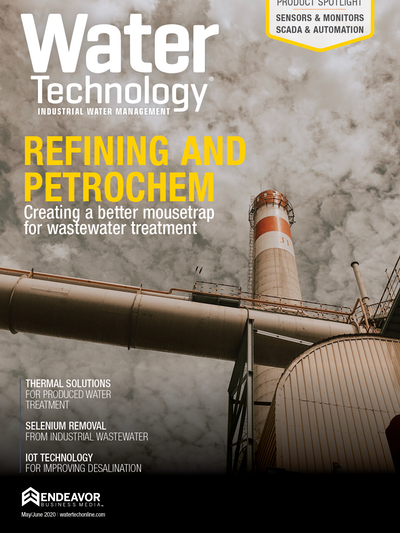Major Advantages of Electrochemical Advanced Oxidation Processes for Treatment of Some Industrial Wastewaters
Jul 01, 2020 — Atlanta, GA

Cover art of the May/June 2020 issue of the trade journal _Water Technology_.
BBISS director John Crittenden recently published a cover story with co-author David Kujawski in the professional journal, Water Technology. The article appears in the May/June 2020 edition, and is entitled “Oil Refining and Petrochemical Wastewater Treatment: Creating a Better Mousetrap.” The piece describes the current practice for treatment of industrial wastewaters using a biological treatment method that is typically known as activated sludge. This method has been in use for about the past century and its effectiveness at treating the most difficult waste streams, such as those found in Oil Refining and Petrochemical industry, is somewhat limited. Electrochemical Advanced Oxidation Processes (eAOPs) offer notable advantages over activated sludge, especially with waste streams that contain high levels of complex hydrocarbons and exhibit highly variable levels of contaminant concentration.
Pilot studies with eAOPs have been performed in commercial production facilities with favorable results. The major benefits of the latest generation of eAOPs over biological methods include major reduction in treatment time, complete elimination of the treatment and disposal of biological sludge, reduced energy usage and cost, reduced monitoring and management costs, reduced maintenance cost and complexity, and greater overall reductions in contaminant levels. Based on the data gained from pilot studies in certain wastewater treatment contexts, eAOP systems could offer benefits significant enough to warrant complete conversion to the new technology.
Researching technologies and techniques that can provide cleaner water for everyone is a primary research area for the Brook Byers Institute for Sustainable Systems. Clean water is also goal number 6 of the 17 Sustainable Development Goals established by the United Nations General Assembly in 2015. It states: "Ensure availability and sustainable management of water and sanitation for all." As fresh water supplies become contaminated with a larger variety of novel substances, like agricultural chemicals, petrochemical wastewaters, and pharmaceuticals, new water treatment technologies will be an important area of research to help our society meet our sustainability goals.
Brent Verrill, Research Communications Program Manager, BBISS




